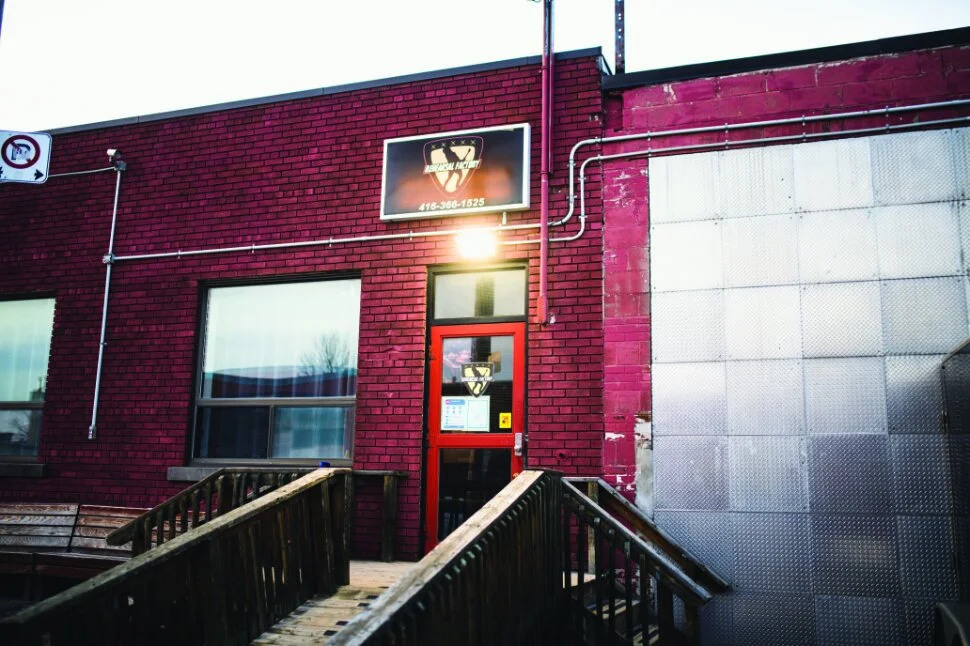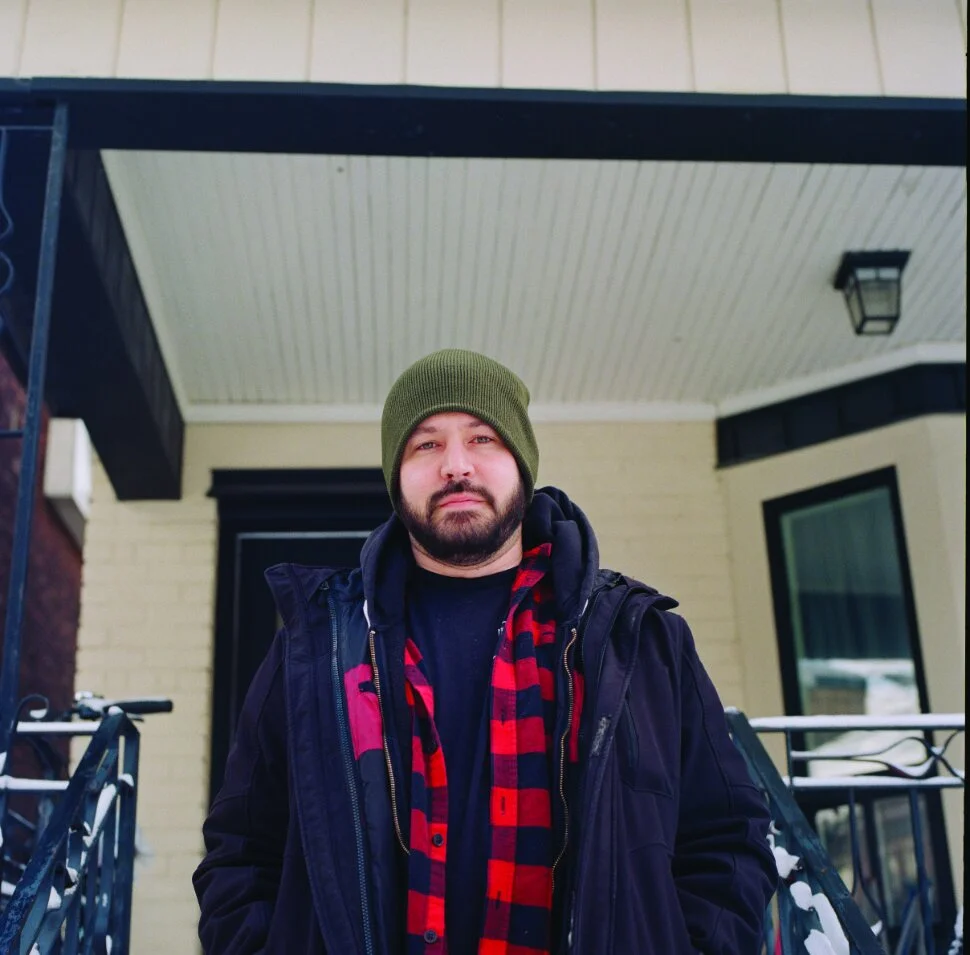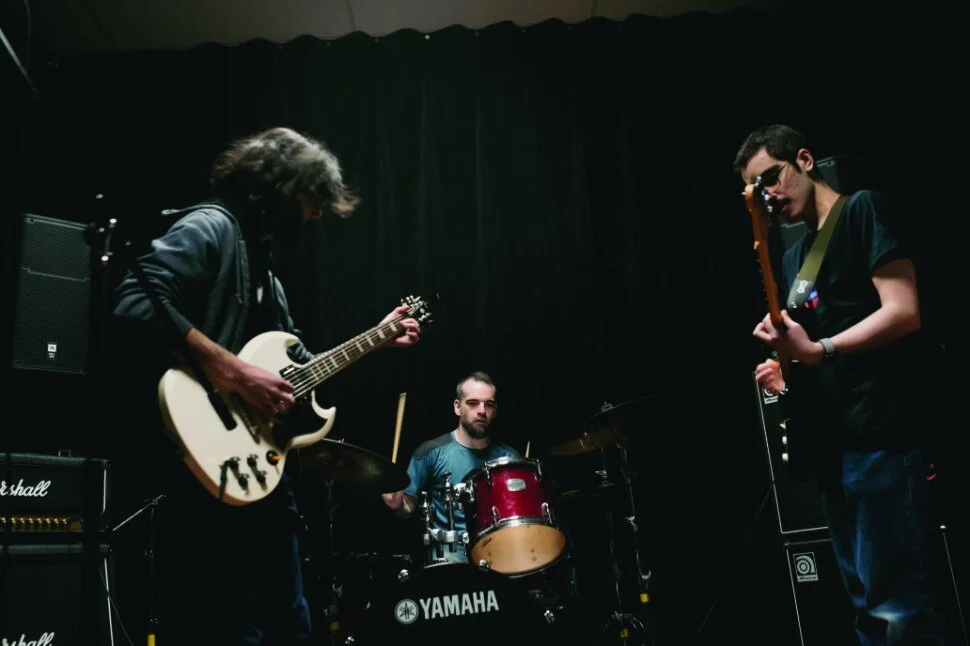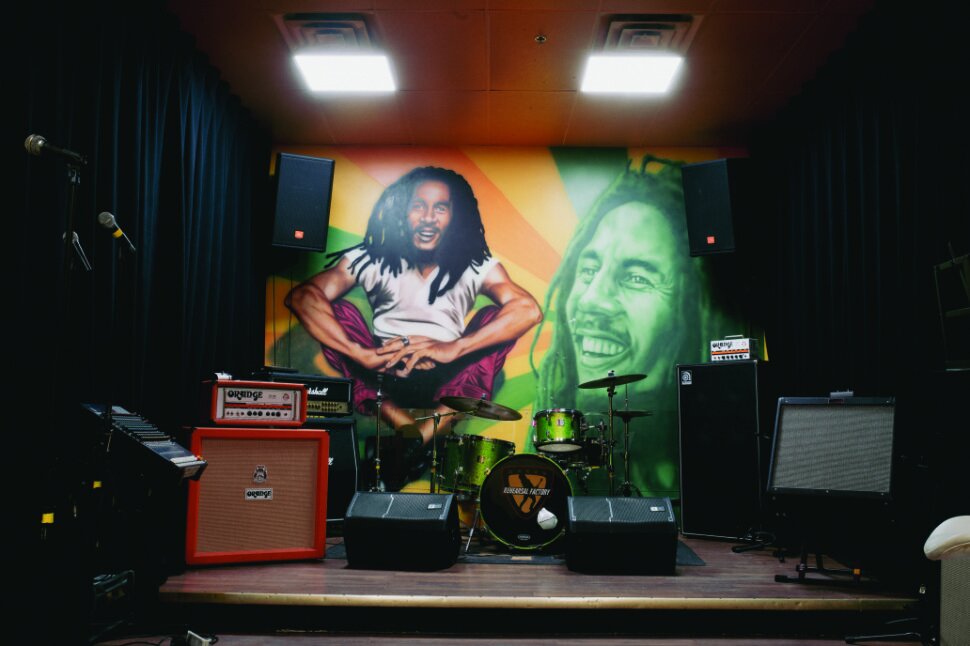SAVING MUSIC CITY
FROM FEBRUARY/MARCH 2022 ISSUE OF WEST END PHOENIX
Over the past five years, little more than a quarter of Toronto’s rehearsal spaces have survived, chipped away by an inflated real estate market and then the death knell of shutdowns
Half of the city’s remaining stock of jam rooms were packed into the Rehearsal Factory on Geary, which in January was bought up by an evangelical hipster church for $12.8 million. Now, a group of artists is banding together to defend what little space remains for making music
This winter, Alain Benichou was evicted – not from his home, but from his jam space. The 33-year-old guitarist and his hardcore band, Abraxas Reflux, have been renting a studio at the Rehearsal Factory on Geary Avenue for three years. In mid-January, the company informed them the building had been sold: Benichou and his band have to vacate the premises by March 15. The eviction notice ended with a solemn “Keep on rocking.”
Benichou is one of the hundreds of musicians who have received letters like these. Just five years ago, there were more than 400 rentable rehearsal rooms in Toronto. But as the city has become more expensive, practice studios – much like concert venues – have been steadily shuttering. The pandemic, which barred bands from practising and performing, only further decimated the stock. Today, there are fewer than 150 studios left.
While the closure of the Geary Rehearsal Factory may not be surprising, it is significant. That’s not just because of its size – it has about 100 rooms across 36,000 square feet – but also because of its buyer. It was scooped up not by condo developers but by a church.
C3, a so-called “hipster” Christian movement known for its tattooed pastors and Instagrammable services, purchased the two-building property for $12.8 million. The church’s plan for the site, which noted its proximity to the trendy North of Brooklyn Pizzeria and Blood Brothers Brewery, proposed constructing a new 1,500-seat house of worship.
“When I found out, I was like, ‘Oh my god, my jam space is getting sold to evangelicals,’” says Benichou. “Our band is super upset about it.” It wasn’t just the inconvenience of looking for a new space or lugging fridge-sized amps and sprawling pedal boards back home. It was the fact that the band was being displaced by a church mired in controversy. C3 appears on cult-watch lists. It tithes its parishioners, recommending that they give 10 per cent of their annual income to the church. And it is firmly against same-sex marriage. “One member of our band is a part of the LGBTQ+ community,” says Benichou, “so it’s extra terrible.”
Alain Benichou and his band Abraxas Reflux were among hundreds of musicians who are being evicted from their practice spaces in The Rehearsal Factory in January. They move out March 15.
C3’s arrival has rankled the Geary community at large. A number of tenants at 330 Geary – the half of the property that C3 will continue to lease to musicians for at least three years – chose to leave in protest, unwilling to give any money to their new landlords. An online petition against the church’s purchase garnered more than 3,500 signatures. “[C3’s] opposition to same-sex marriage, cannabis culture and BLM do not align with the values of the Geary Avenue community,” the petition read.
This showdown is more than just a referendum on C3. It’s symbolic of a larger fight for rehearsal spaces – and, by extension, the soul of Toronto’s live music scene.
C3 arrived in Toronto in the mid-2010s, but its roots reach back decades. Phil and Christine Pringle, the husband-and-wife team behind the movement, met as preteens, lived together at a hippie commune in New Zealand, then founded the church in 1980. Today, C3 has more than 500 chapters and 100,000 followers around the world. Like other charismatic Pentecostal movements from down under – including Hillsong, Justin Bieber’s church of choice – C3 has eschewed incense and stained glass in favour of a more modern aesthetic. Its pastors wear ripped skinny jeans and face piercings, and its Sunday services look like Coldplay concerts.
For members, these distinguishing factors are a welcome change from the stuffiness of other Christian denominations. C3, they say, is a supportive, non-judgmental environment. But critics contend that the church uses vague, uplifting language to attract wayward young people, only to reveal its most controversial beliefs and practices months later. The internet is full of personal stories written by once-giddy C3 adherents who felt blindsided by the church’s anti-LGBTQ+ dogma. “Marriage was instituted by God, ratified by Jesus, and is exclusively between a man and a woman,” the church’s website states. “Sex is a gift from God for procreation and unity, and it is only appropriate within and designed for marriage.”
The Toronto chapter is run by Sam and Jess Picken, alumni of the C3 bible college in Australia. To grow their flock, the couple led services in various rented venues: high school gyms, concert halls, even a Rehearsal Factory room. Then, in late 2021, they made the studio complex their permanent home.
C3, a registered charity, has asked its parishioners to donate “over and above” their 10 per cent tithe to help pay off the $10-million loan that it used to buy the Geary property. In a brochure about the new site, one question in the FAQ asks whether C3 members should give even if they’re in significant debt. “No matter what financial position you find yourself in, remember honouring God with your tithe always comes first,” the brochure reads.
Astray, who are continuing to book rooms on a casual basis.
Sam Picken declined an interview request through Grey Fry, the church’s business director and campus pastor. “As you may have seen from our Instagram or website, we are a church who love God and love our city,” Fry wrote in an email. He outlined C3’s vision for the Geary site: a community hub with a multi-use auditorium, daycare spaces, creative studios, training facilities and offices. “Our church has an important role in serving our community and partnering with local organizations to better reflect God’s heart for this city,” he wrote. “We see the space on Geary as an awesome opportunity to do just that – create a place of resourcing, celebrating and partnering with the community around us.”
The land that C3 bought, however, is zoned for employment, not a place of worship. If the church wants to execute its master plan, it will need to convince the city to rezone the area, which will involve enduring what is sure to be a testy public consultation. Ana Bailão, the city councillor for Davenport, put it bluntly in an interview: “I’m not supportive of having a place of worship in this employment area.”
Rehearsal rooms are not glamorous places. They have no windows, their floors are sticky with spilt beer, and their walls are lined with dank sound-dampening curtains. Yet they are invaluable. While some bands are lucky enough to have basements and garages at their disposal, many musicians rely on studios to sustain their art. For about $20 an hour – or roughly $600 a month – these places provide both amateurs and professionals the space and gear to rehearse the same songs for hours without violating noise bylaws or annoying neighbours. These rooms help bands sprout up, develop new work and practise for gigs. Without them, the music scene would atrophy.
For decades, Toronto has largely relied on Rehearsal Factory to provide these spaces. The company was founded in 1990, when Chris Skinner and a musician friend bought a small rehearsal room near Yonge and Wellesley. The studio was in a condemned building with no heat or electricity, but Skinner slowly spruced it up, adding more rooms over the years. “It was a humongous losing venture,” he says, laughing. His friend left the business, but Skinner stuck with it. When the studio began turning a profit, he expanded, purchasing buildings on Richmond and Front Streets. At its peak, Rehearsal Factory operated more than 400 rooms across eight locations.
Then COVID hit. With lock-downs and no shows to practise for, Rehearsal Factory lost $2 million. Skinner, who is now in his 60s, also recently suffered a heart attack. He decided to retire and sell the buildings. After C3 bought Geary, someone threw a brick through Skinner’s window at 3 a.m. (He says he didn’t know who the buyer was; in the paperwork, the church was a numbered company.) “It’s breaking my heart to stop running this business,” says Skinner. “But the last two years of trying to survive COVID, trying to survive shutdowns, trying to keep tenants, trying not to raise rents – what an absolute nightmare.”
Spurred by the closures, Benichou connected with fellow musicians and Rehearsal Factory tenants Ryan Roantree and Paul Ramirez, the drummer in the Juno-nominated punk band The Flatliners, to found Music Needs Space TO. The non-profit advocacy group has been pushing municipal and provincial politicians to defend the remaining supply of rehearsal rooms and devise policies that will create more.
The group caught the attention of Bailão, a member of the city’s music advisory committee, who ordered an inventory of existing studios. “It clearly showed us, with data, the dire situation of rehearsal spaces all over the city, and the need for us to act,” she says. “When you’re losing these spaces, particularly in neighbourhoods where a lot of musicians live, it’s very concerning.”
In early February, city council adopted Bailão’s motion to explore a series of tools that could birth new rehearsal rooms, including placing studios in city-owned properties and requiring developers to subsidize such spaces. Judging by a city report on the topic, these measures can’t arrive soon enough. “Toronto’s music community has become increasingly threatened by a combination of factors including overall affordability and the gradual erosion of a grassroots ecosystem of live venues, rehearsal and recording studios, and do-it-yourself spaces and events,” the report concluded. “These trends are collectively contributing to an exodus of musicians out of Toronto to other, less expensive cities.”
Some artists have already left. “If all these places close, in 15 years, there will be no new PUP, no new METZ, no new Flatliners. All of them will have moved to Hamilton,” says Ramirez. “Music is something that Toronto prides itself on, and it’s something that could be in jeopardy if musicians don’t have spaces.”
Ramirez is a part of the Geary Coalition, a group of locals, artists and ex-C3 members who launched the online petition. Though they didn’t stop the sale, Ramirez plans to continue opposing the church’s rezoning application. “In a dream scenario, I want them to get frustrated and put the place back on the market in a year or two years from now,” he says. “Hopefully the music community can retain that space.”
The members of Music Needs Space TO dream of partnering with the city and music companies – think Long and McQuade or Spotify – to establish a musical community centre, a one-stop shop where artists can practise, record, take lessons and repair their instruments. “We’re trying to keep the Toronto music scene as vibrant and as eclectic as it’s always been,” says Ramirez.
Benichou and his band could use a space like that. They recently started looking for a new rehearsal studio. So far, they’ve had no luck. As Benichou tells it, when Geary closes, his band will lose not just a room, but also a circle of like-minded artists. “That’s my biggest fear, that the community will lose the ability to bandwagon onto each other’s shows, to find new band members and new genres, to meet all these different people,” he says. “That’s the real communal loss.”




